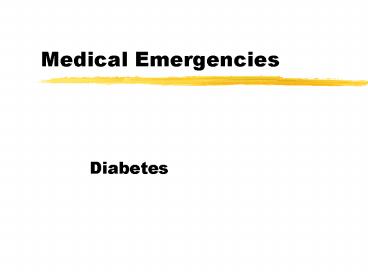Medical Emergencies - PowerPoint PPT Presentation
1 / 21
Title:
Medical Emergencies
Description:
Gluconeogenesis from fat. Regulation of Glucose Metabolism ... Increases gluconeogenesis. Released as blood glucose levels drop. Review of Glucose Regulation ... – PowerPoint PPT presentation
Number of Views:76
Avg rating:3.0/5.0
Title: Medical Emergencies
1
Medical Emergencies
- Diabetes
2
Topics
- AP Review
- Regulation of glucose metabolism
- Pathophysiology
- Diabetic Emergencies
3
AP Review
4
Pancreas Hormones
- Alpha cells (20) glucagon
- Beta cells(75) insulin
5
Pancreas Hormone Action
6
Glucose Regulation
7
Insulin Mechanism
- Increase glucose transport
- Increase glucose metabolism
- Increase liver glycogen levels
- Decrease blood glucose
8
Glucagon Mechanism
- Release glycogen reserves
- Gluconeogenesis from fat
9
Regulation of Glucose Metabolism
- Normal Range 60 - 120 mg/dl
- Sources
- Carbohydrates
- Fats
- Proteins
- Digestion
10
Carbohydrate Metabolism
- Carbohydrate ingestion prompts insulin release
- Glucose used by body cells, excess stored by
liver (glycogen) - Glycogen released when blood glucose drops
- Insulin has little effect on brain glucose
11
Fat Metabolism
- Glucose converted to fatty acids in liver
- Insulin allows storage of fatty acids
- ? insulin ? ? fatty acid metabolism
- Ketones are a result
- ? ketones ? acidosis
12
Glucagon Action
- Opposes insulin
- Promotes glycogen release breakdown
- Increases gluconeogenesis
- Released as blood glucose levels drop
13
Review of Glucose Regulation
- Liver is a glucose buffer
- Insulin and glucagon make up feedback loop
- ? blood glucose ? sympathetic stimulation
14
Pathophysiology
- Too little insulin or,
- Ineffective insulin
15
Type I Diabetes Mellitus
- Too little insulin produced
- Onset at any age
- Treatment insulin injections, exercise and diet
modifications - May lead to hypo- or hyperglycemia
16
Type II Diabetes Mellitus
- ? insulin production ? tissue sensitivity
- Usually adult overweight onset
- Treatment diet, exercise, oral hypoglycemic
meds. - May lead to hypo- or hyperglycemia
17
Effects of Diabetes Mellitus
- ? blood glucose, ketoacidosis
- Glucose in urine, dehydration
- Acidosis
- Blindness
- Kidney disease dialysis
- Neuropathy
- Heart disease and stroke
18
Diabetic Emergencies
- Hypoglycemia (insulin shock)
- Hyperglycemia (DKA)
- Hyperosmolar Hyperglycemic Nonketotic Coma
19
Hypoglycemia
- Caused by an imbalance between insulin and
glucose - Rapid onset
- Signs Symptoms
- Management
20
Diabetic Ketoacidosis (DKA)
- Inadequate insulin
- Cells use fat for energy
- Hyperglycemia causes osmotic diuresis
- Slower onset (12 - 48 hours)
- Signs Symptoms
- Management
21
Hyperosmolar Hyperglycemic Nonketotic Coma (HHNK)
- Enough insulin present to prevent ketoacidosis
- Not enough to lower glucose levels
- Osmotic diuresis causes dehydration
- Signs Symptoms
- Management































